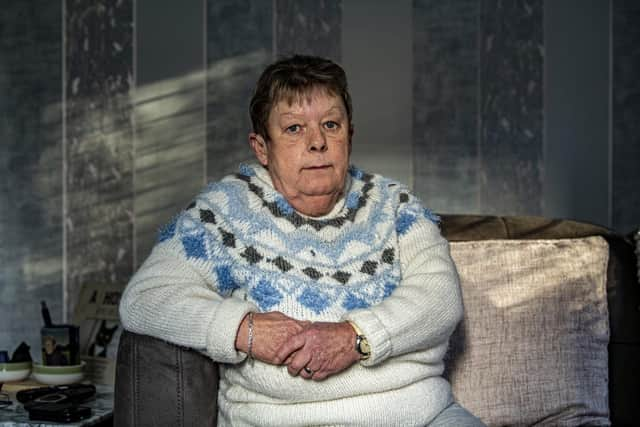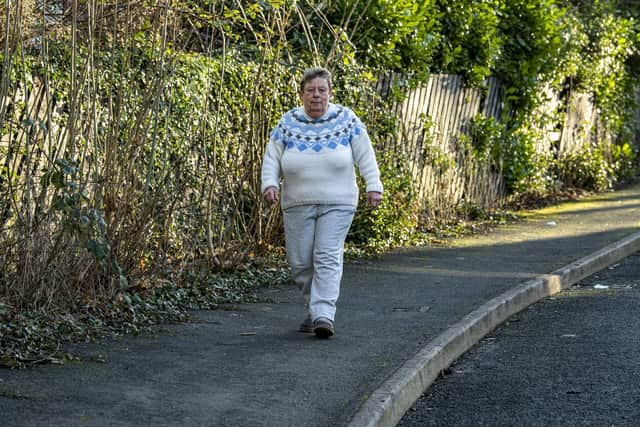Leeds woman urges people to get smear test after cervical cancer diagnosis as doctors push to improve uptake
and live on Freeview channel 276
Dianne Ward, 54, had to undergo a hysterectomy in 2014 to remove cervical cancer that had spread to her womb - and lives in fear that the cancer will return.
She is urging people with a cervix not to ignore their screening invitation, stressing the importance of catching abnormal cells early on.
Advertisement
Hide AdAdvertisement
Hide AdIt comes as Leeds Cancer Programme works to raise awareness of cervical screening for Cervical Cancer Prevention Week, which runs until tomorrow.


There was a screening uptake of 70.3 per cent in Leeds as of October 2021, the latest available figures, almost 10 per cent below the national target for screening for those aged 25-64.
Uptake ranges from 30.5 per cent to 80.5 per cent across local GP practices in the city.
After a routine screening found abnormal cells, Dianne, from Beeston, underwent multiple colposcopies before she was diagnosed with cervical cancer in December 2014.


Advertisement
Hide AdAdvertisement
Hide AdSpeaking to the Yorkshire Evening Post, she said: "I got a phone call from the specialist just before Christmas. It was a Friday, I’ll always remember.
“He asked me to come in on the Monday to see him and I knew straight away that it was cancer."
She opted for a full hysterectomy in March 2015 and when doctors operated, they found the cancer had spread to her womb.
Although Dianne got the all-clear, she said the impact of having cancer has stayed with her far beyond the operation.


“It’s a life sentence,” she added.
Advertisement
Hide AdAdvertisement
Hide Ad“I’ve got ill health anyway so every time I get backache or pain I think I’ve got cancer again. It doesn’t end when you’ve got rid of it, I didn’t think it could affect you mentally like it has.
“I know I’m one of the lucky ones because I’m still here. But there are a lot of other people who have lost their lives to cancer and that upsets me.
“I want people going through it to know they’re not on their own.”
Advertisement
Hide AdAdvertisement
Hide AdLeeds Cancer Programme is highlighting its work to increase cervical cancer screening across the city, as part of Cervical Cancer Prevention Week.
The programme includes working with 'cancer screening champions’, located in medical practices identified as having low uptake, who chase up patients who haven’t responded to their screening invitation.
And its Cancer Wise Leeds initiative, funded by Yorkshire Cancer Research, employs screening coordinators across the city to help practices identify and target any barriers to screening.
Dr Andy Robinson, lead GP for cancer prevention, screening and awareness at Leeds NHS Clinical Commissioning Group, said: "Our strategy across Leeds is to improve the early diagnosis of cervical cancer.
Advertisement
Hide AdAdvertisement
Hide Ad"We hope to achieve this by raising awareness of the signs and symptoms of the disease and emphasising the importance of screening for it.
“As always I would urge everyone to attend their cervical screening appointments, as the sooner any abnormalities are detected the better the treatment outcomes are.”
Cervical Cancer Prevention Week, led by Jo's Cervical Cancer Trust, aims to help those who face an unexpected result during their screening to know that they are not alone, as well as raising awareness of the importance of having the test.
Advertisement
Hide AdAdvertisement
Hide AdThe charity's chief executive, Samantha Dixon, said: "We want everyone to have the support and facts they need to access cervical screening and deal with an unexpected result.
"Cervical screening can help stop cervical cancer before it starts so it’s an incredibly important test."
“Go and get it. For goodness sake, get it," Dianne added.
"It’s not nice for a few minutes, but I would advise anybody to have it done.”
What happens at a cervical cancer screening, according to the NHS
Advertisement
Hide AdAdvertisement
Hide AdCervical screening (a smear test) checks the health of your cervix. The cervix is the opening to your womb from your vagina.
During cervical screening a small sample of cells is taken from your cervix for testing.
It's not a test for cancer, it's a test to help prevent cancer. All women and people with a cervix aged 25 to 64 should be invited by letter.
The test itself should take less than five minutes. The whole appointment should take about 10 minutes.
It's usually done by a female nurse or doctor.
Advertisement
Hide AdAdvertisement
Hide AdBefore starting, they should explain what will happen during the test and answer any questions you have.
The sample is checked for certain types of human papillomavirus (HPV) that can cause changes to the cells of your cervix. These are called "high risk" types of HPV.
If these types of HPV are not found, you do not need any further tests.
If these types of HPV are found, the sample is then checked for any changes in the cells of your cervix. These can then be treated before they get a chance to turn into cervical cancer.
Advertisement
Hide AdAdvertisement
Hide AdYou'll get your results by letter, usually in about two weeks. It will explain what happens next.
Support the YEP and become a subscriber today. Enjoy unlimited access to local news and the latest on Leeds United. With a digital subscription, you'll see fewer ads, enjoy faster load times, and get access to exclusive newsletters and content. Click here to subscribe.
